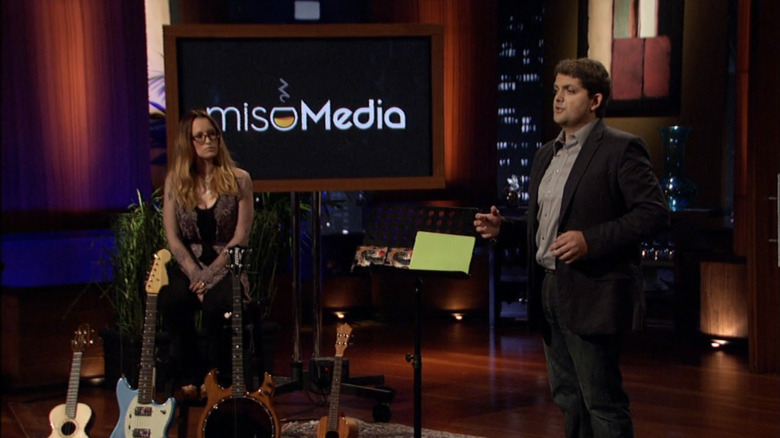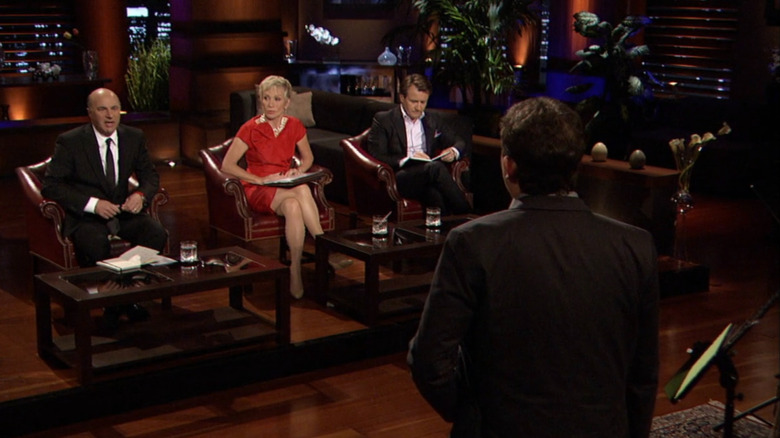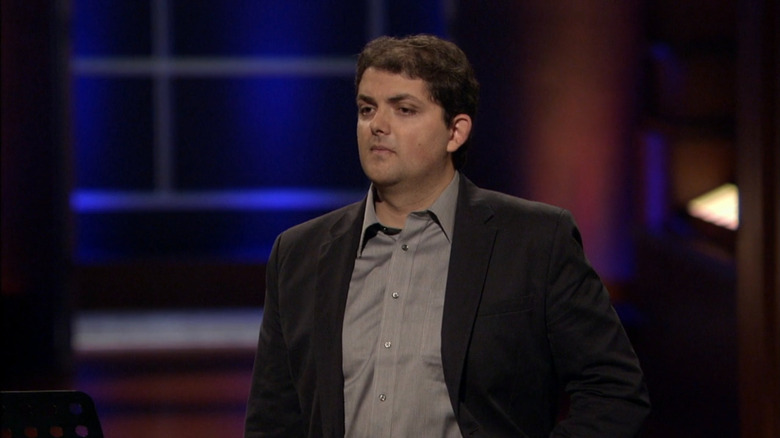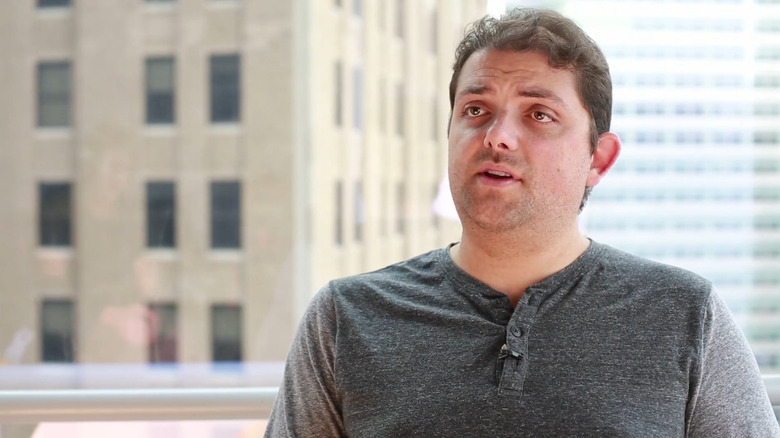What Happened To The Miso Media App From Shark Tank Season 3?
Learning how to play an instrument using a smartphone app offers a level of convenience you're unlikely to find by teaching yourself traditionally. On one of the earliest seasons of "Shark Tank," entrepreneur Aviv Grill sought to bring his own spin to the marketplace through his company, Miso Media. The business' selling point was Miso Music, an app where users learned how to play string instruments.
Miso officially launched in 2007. Grill and a partner from a previous startup venture began developing a prototype for what would become the Miso Music app. With Grill's mother working as an opera singer and his father as a recording engineer, his interest in the music industry was already there, making it an easy move for him. The team developed several partnerships with major instrument brands such as Fender and Kohala Ukeleles and even won a TechCrunch Disrupt People's Choice Award in 2010.
Appearing on "Shark Tank" Season 3 — the same as other notable pitches such as Unikey and the Sullivan Generator — Grill hoped that his company's impressive technology and host of big-name investors would be more than enough to get a deal with one of the show's celebrity investors. However, many of the Sharks grew skeptical of Grill's intentions and felt his deal undervalued them as investors.
What happened to Miso Media on Shark Tank?
Aviv Grill entered "Shark Tank" hoping to receive a $300,000 investment for a 5% equity stake. Grill had famed singer and company advisor Ingrid Michaelson appear to play one of her songs using the app. A few months prior to appearing on the show, Grill had wrapped up a funding round with Google who, along with notable names such as Justin Timberlake, had put $100,000 into the company.
The Miso Music app saw 80,000 downloads. The app itself was free, but users could buy sheet music from a variety of big-name artists to practice from in the in-app store. The company had converted 8% of its user base into paying customers, with 35,000 downloads equating to $40,000 in revenue. He further explained that the company's $6 million valuation was based on its traction, with the inclusion of software and big names they had seen since their last investment round when they were valued at $3 million.
Daymond John felt that Grill was using "Shark Tank" for publicity, feeling that the entrepreneur already had what he needed and was undervaluing the Sharks with his 5% equity offer. Despite Grill stating that he believed the Sharks were brilliant investors, John went out, as did Barbara Corcoran shortly after. Kevin O'Leary and Robert Herjavec made their own offers, but only at the $3 million valuation offered at the prior funding round. Mark Cuban offered the $300,000 for 8% equity, so long as Grill committed to releasing a premium version of the app in the near future, to which the entrepreneur agreed and made the deal.
Miso Media after Shark Tank
Even before its "Shark Tank" episode aired, Miso Media saw exciting progress. In between the segment's filming in mid-2011 and its eventual broadcast on March 16, 2012, the company raised another $2.4 million in Series A funding. In the immediate aftermath of an episode's airing, featured businesses often enjoy what is known as the "Shark Tank" effect, where a company receives an influx of website traffic and sales from "Tank" viewers following its segment airing. Miso Music was no exception to this sudden growth; the website and in-app store received such a burst of traffic after the show that it even crashed.
Keeping in line with investor Mark Cuban's request to increase monetization efforts, the app also transitioned from being free to costing $0.99. While this caused contention with some users, it didn't stop the app from gaining notable traction, making it into the Top 20 most-downloaded music apps and even briefly being among the 10 best-selling paid apps. The team also garnered notable acclaim, such as designer and co-founder Joselle Ho being listed among Forbes' Female Founders to Watch list in June 2012.
Why did Miso Media go out of business?
With such a promising set of circumstances, Miso Media seemed destined for greatness. However, all it takes are a few haphazard decisions to sink a seemingly sturdy ship in the world of business, and Miso's aggressive ambitions would cause its downfall not long after its time on "Shark Tank."
Founder Aviv Grill gave a candid, detailed account of what went down in a 2014 interview with Inc. Magazine. In it, he shared that, despite finding success, the team wasn't satisfied with their current direction. "We realized that we either had to deal with the product that was going to get massive publicity that we weren't really thrilled about or move on to the next thing," Grill shared. "But in that moment when ... you know that you're going to have millions of people seeing a specific product and you're not happy with that product, instinctually the first thing you want to do is, 'well let's improve the product ...'"
The company split into two divisions, with one focusing on improving the guitar-learning app and the other responsible for developing a sheet music app. However, this endeavor proved difficult to manage, with neither division getting the full attention it needed. The team attempted to correct this by shutting down the guitar app entirely and focusing solely on the sheet music app. But with funds running thin, they only managed to release a simplified version of what they initially envisioned. With frustrated investors refusing to provide additional funding, the team experienced significant layoffs and the company itself closed its doors in March 2013.
What's next for Miso Media's founder?
At the end of the day, even with millions of dollars invested, big names such as Mark Cuban and Google on its side, and skyrocketing sales following "Shark Tank," Miso Media failed to hold its tune. It's hard to envision how the app would fare today with the influx of similar music-learning apps and services available, but with the wealth of resources at its fingertips, it could have easily evolved to keep up with the competition. Its ultimate fate teaches us that no matter what a business's assets are, a clear, singular vision is key to keeping operations running smoothly.
Speaking with Inc. Magazine, Aviv Grill shared that closing down Miso Media was a rough experience, even stating, "I'm not very good at losing, I hate the losses more than I love the wins." He added that if he were to go through the experience again, he'd use the funding and many months of development to focus solely on the sheet music app. Thankfully, the lessons Grill learned throughout the experience have led him to many fruitful career opportunities down the line.
His experiences span far and wide, having worked in various directorial and consultation positions for companies such as Blend, LineforLine, Meredith Corporation, and Breathwrk Inc. His entrepreneurial side hasn't evaded him either, with Grill co-founding video platform services such as Tiki between 2012 and 2014 and Soapbox between 2014 and 2019. More recently, he has taken on investor roles in various tech and equipment firms.




